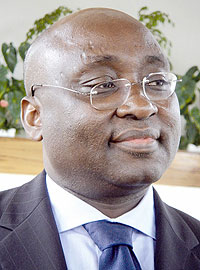ABIDJAN - The African Development Bank (AfDB) will expand investment under its infrastructure portfolio including energy, transport, sanitation (water) and telecommunications on the Continent, with the expected additional capital increase of 200 percent this year, the Bank has said.


ABIDJAN - The African Development Bank (AfDB) will expand investment under its infrastructure portfolio including energy, transport, sanitation (water) and telecommunications on the Continent, with the expected additional capital increase of 200 percent this year, the Bank has said.
Addressing a press conference on Tuesday, Dr Donald Kaberuka, the President of the Bank, said that the problem of inadequate infrastructure on the Continent cannot be over-emphasized.
"A mega watt of electricity needs a million dollars, and with such a large infrastructure gap on the Continent, even the tripling of the capital of this bank alone is still a drop in the Ocean,” he said.
Kaberuka also mentioned that Africa needs more support from development partners in addition to its own capital in order for the Bank to continue addressing the infrastructure gaps.
"Africa will need much more than the African Development Bank’s own capital. It (capital increase) is significant but it is still very low of what Africa needs at this time. We intend to use our new capital to leverage our capacity to bring in additional investments from outside,” he said.
In 2009, infrastructure sector project approvals hit $6.13 billion accounting for 52 percent of the Bank’s total loans and grants approvals.
Specifically for Rwanda, $4.1 million was injected in a railways study to extend the Dar es Salaam – Isaka line to Rwanda and Burundi.
In a separate interview with The New Times on Wednesday, Thierry de Longuemar, the Vice President in charge of Finance at the Bank, also noted Africa’s huge infrastructure deficit originates from historical low investment in the sector in the past.
"We are in a catch-up mood; we need to invest in that entire infrastructure that does not exist and that is why there seems to exit a huge gap.
"There are very few places in Africa where you have an efficient highway system except in South Africa. Clearly there is a weakness that we need to correct and we are actively trying to do that,” he observed.
Longuemar also noted that financing infrastructure is critical for African countries to sustain economic growth.
"Infrastructure has a direct link for land-locked countries to sustain higher growth rates- typically the corridors that we aim at financing will help land locked countries to either have better access to neighbouring countries or have better access to the sea because as we know, typically Rwanda’s weakness is that it has no access to the sea,” he said.
AfDB will start arranging project finance jointly with commercial banks, and selling maturing debt in its portfolio, as it battles to bridge the gap between Africa’s infrastructure needs.
Research published in November last year from the World Bank–backed infrastructure Consortium for Africa, said that Sub-Saharan Africa needed to double infrastructure spending to $93 billion a year to upgrade roads,water and power networks.
In the 2010 fiscal year, 40 percent of an estimated $2 billion of the bank’s new lending will be in infrastructure, 30 percent in industries and services and 30 percent in financial services.
Ends


